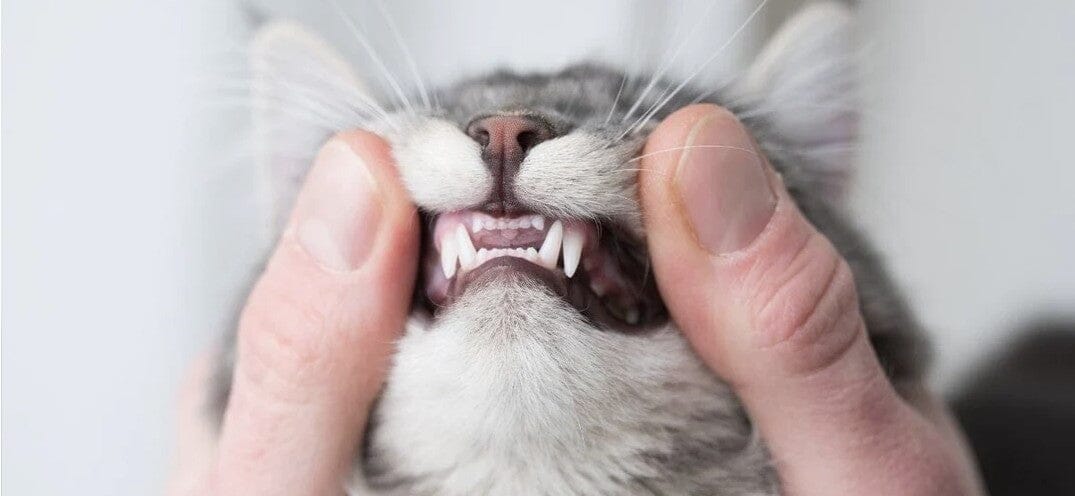Did you know that many cats have gum diseases or mouth issues by the time they turn two years old? Brushing your cat’s teeth is an important part of keeping them healthy. Just like humans, cats might have dental issues if their teeth aren’t cared for. Regular brushing helps remove plaque and prevent bad breath, gum disease, and tooth decay for your kitty.
Explore why taking a few minutes each week to brush your cat’s teeth, may help them live happier and healthier life.
Table of Contents
- What are the Symptoms of Poor Dental Health in Cats?
- What Causes Bad Breath in Cats?
- What are the Benefits of Brushing Your Cat's Teeth?
- 1. Taking good care of your cat’s mouth and gums helps to prevent bad breath.
- 2. Brushing your cats teeth helps your kitty to stay at a healthy weight
- 3. Brushing teeth helps to prevent respiratory infections
- 4. A healthy mouth and gums leads to a healthier cat!
- If a cat has bacteria or plaque in their mouth, are there long term risks?
- 1. Poor dental health may increase the risk of mouth tumors.
- 2. Gingivitis is a result of plaque buildup
- 3. Stomatitis is a painful disease of the mouth
- How to Care for & Brush Your Cat's Teeth
What are the Symptoms of Poor Dental Health in Cats?
It is tricky to know when cats are suffering. Survival instincts cause cats to hide their pain, as weakness can attract and make them targets for predators. Some possible symptoms of a bigger dental problem in your cat may include:
- Bad Breath
- Red, Swollen or Bleeding Gums
- Inflammed gums, tongue or lips
- Refusing to eat
What Causes Bad Breath in Cats?
Taking care of your cat's teeth has many benefits. It not only helps to keep them from cavities and tooth decay, but also helps to avoid other gum diseases. Bacteria and plaque buildup causes many short term and long term issues.
What are the Benefits of Brushing Your Cat's Teeth?
Taking care of your cat's teeth has many benefits. It not only helps to keep them from cavities and tooth decay, but also helps to avoid other gum diseases. Bacteria and plaque buildup causes many short term and long term issues.
1. Taking good care of your cat’s mouth and gums helps to prevent bad breath.
Removing the plaque and tartar from your cat’s teeth a few times a week helps prevent bacteria growth and keeps their breath fresh.
2. Brushing your cats teeth helps your kitty to stay at a healthy weight
Healthy cats are not too chubby and not too thin. Gaining too much weight is as dangerous to cats as it is to human beings.  Typically, cats are considered overweight when they weigh 20% above their standard bodyweight. As enjoyable as snacks and treats are, for chubby kitties, cutting down is best. Brushing your cat’s teeth helps them to cut down on snacks, as they won’t have a taste for some snacks right after teeth brushing. Snacks or treats should be less than 10% of what they eat.
Typically, cats are considered overweight when they weigh 20% above their standard bodyweight. As enjoyable as snacks and treats are, for chubby kitties, cutting down is best. Brushing your cat’s teeth helps them to cut down on snacks, as they won’t have a taste for some snacks right after teeth brushing. Snacks or treats should be less than 10% of what they eat.
On the other side, a cat with swollen gums, ulcers or other mouth infections might not want to eat because of the pain it causes them. Not eating enough leads to weight loss and not getting enough nutrients. This is not helpful for your cat’s overall health either.
Knowing your cat’s ideal weight is important to help to notice if they may be having health issues.
3. Brushing teeth helps to prevent respiratory infections
Did you know that cats may easily get infections from the things they eat? Cats are not able to tell if food is good or bad for them. Sometimes, they get respiratory infections because of the germs and bacteria they breathe in that end up in their lungs. Our Breathe Easy Cat Cold & Respiratory Infection Remedy helps to relieve sore throats, coughs, fevers, cat flus, runny noses, oral and nasal discharge.
If your cat is having frequent colds, asthma, or other breathing problems, it’s a good idea to check their dental health too. On a more serious note, it is also important to know the signs of cat pneumonia in case emergency care is needed.
4. A healthy mouth and gums leads to a healthier cat!
Typically, dental health helps with overall wellness. Brushing teeth gets rid of bacteria and plaque that might be harmful to our immune system. Bacteria stays in a cat’s mouth long after they eat. Commercial cats foods tend to be stickier and get in between or stuck to the teeth.
Since the bacteria in the mouth is often passed down into the stomach, diarrhea, vomiting, and stomach pains might also be a sign of poor dental health. Poor dental health is one of the major causes of various seemingly unrelated health issues and infections.
As nice as sweet smelling breath whenever they come to cuddle is, having a clean mouth is needed to help your kitty avoid the pain of gum disease, infections, or losing teeth.
If a cat has bacteria or plaque in their mouth, are there long term risks?
1. Poor dental health may increase the risk of mouth tumors.
Does your cat have lumps around their eyes or other parts of their body? If so, it might be time to pay more attention to their dental care. Just like people, pets can get lumps in their mouths called oral papillomas or warts.  These lumps are usually not dangerous, but they can make your cat uncomfortable and might spread. In cats, papillomas often look like scaly patches on their eyelids, neck, head, belly, and legs.
These lumps are usually not dangerous, but they can make your cat uncomfortable and might spread. In cats, papillomas often look like scaly patches on their eyelids, neck, head, belly, and legs.
For older cats, these lumps might also mean their immune system isn't working well and their teeth aren’t healthy. Even though these lumps usually aren’t serious, they can hurt and make your cat not want to eat.
2. Gingivitis is a result of plaque buildup
Gingivitis is usually caused by plaque building up on the teeth. Plaque is a formed by a mixture of bacteria, food, debris, dead skin cells, and mucus. Brushing helps to remove plaque and keep the gums healthier Younger kitties who are getting their adult teeth, are at a higher risk of developing gingivitis. Some breeds, such as Maine Coons, Abyssinians, and Ragdolls, are more likely to suffer from gingivitis.
3. Stomatitis is a painful disease of the mouth
Stomatitis is not necessarily prevented by good dental care, it is believed to be autoimmune in nature, and shows as severe inflammation of the gums. The most common conventional treatment is to remove teeth.
Many cats have avoided losing teeth with our Cat Dental Care & Bad Breath Remedy. Our remedy works from inside the body to help fight inflammation, bring the body back into balance, strengthen the immune system, defeat bacteria and assist the animal to help clear what is the root cause of the problem, and thereby also helping the symptoms such as reducing the inflammation and redness of the gums, and preventing future tarter and plaque build up.
Cats with FIV are also at higher risk of stomatitis. BestLife4Pets Cat Allergy Relief & Immune Support also helps cats with a weakened immune system to fight sickness and infections, even if they are just senior kitties.
How to Care for & Brush Your Cat's Teeth
It's really important to clean your cat's teeth regularly for their dental and overall health. Be committed to brushing your cat’s teeth at least a few times per week. Getting a kitten comfortable with having their teeth brushed is easier than a senior cat. If you adopt a young cat, start brushing their teeth and training them once they have adapted to their new home.

It is also important to use the right toothbrush made specially for cats. Human toothbrushes are too big and too hard.
Your fur friend’s toothbrush should be smaller and softer than the standard human toothbrush. Finger toothbrushes are a great way to protect your finger and clean their teeth.
Never use your own toothpaste for your cat as most human toothpaste ingredients are toxic to cats. Coconut oil is a great natural way to clean your cat’s teeth, or there are other toothpaste products made just for cats.
Of course, brushing a cat's teeth might come with lots of fighting and scratching. A cat having mouth pain might not let their pawrent near their mouth. If your kitty runs and hides, or throws a fit every time you try to go near their mouth, there are other ways to keep their mouth healthy.
Our Dental Care Remedy for Cats is the smart and all-natural solution for healthy toothy smiles. It’s been formulated to help with good oral health and has a new ingredient this year to specifically target halitosis (bad breath). This natural dental care remedy helps relieve inflamed gums, mouth sores (stomatitis), and pain, while aiding in reducing plaque buildup, tooth loss, and gingivitis. Get the benefits of a clean mouth and pain-free life, without the side effects.
Our remedy comes in easy to give tiny pills that are odorless and tasteless. They have also been designed to allow you to crush them, dissolve them or place them in their food. Your cat won’t even realize that they’ve just helped to clear up their mouth bacteria and improve their oral health.
While it is possible that your cat will need professional dental treatment at some stage of their life, regular dental home care with improve dental health and whole life health for your furry family member. It’s totally worth the effort!



